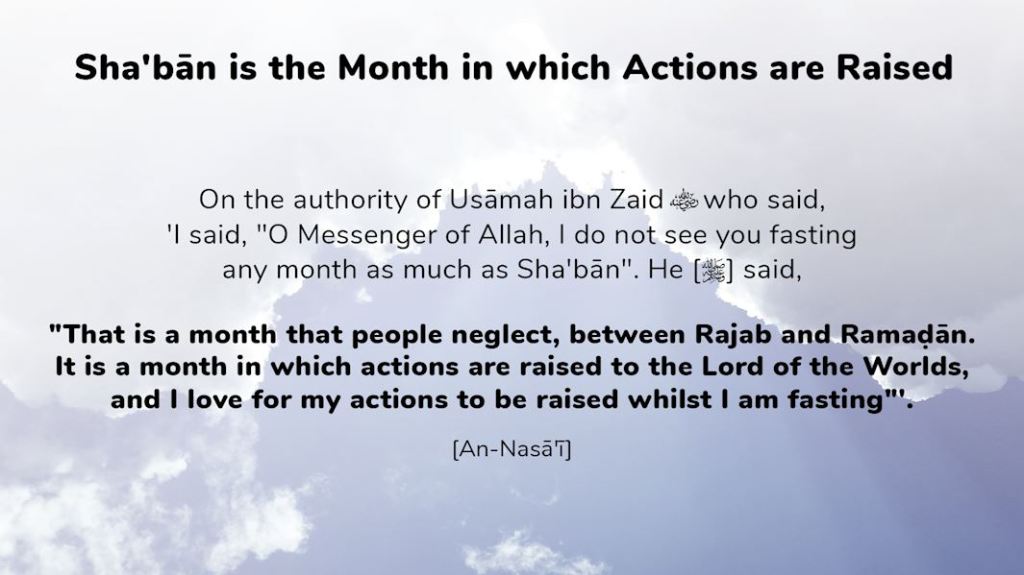Shaʿbān is the 8th month in the lunar islamic calendar.
Shaʿbān incorporates the meanings; to split, separate or scatter. Some of the reasons why this month is named Shaʿbān is that it is the month that splits or separates two great months, namely, Rajab and Ramaḍān. Another reason for it’s name is that ancient Arabs would scatter in travel to various lands during the month, in search of business, fertile lands, water and or to engage in military warfare after the prohibited sacred month of Rajab. The month of Shaʿbān was also the season for branches to scatter in growth. That being said, Shaʿbān is an important month in Islam. Here-below are some action items for the virtuous month, from prophetic teachings and islamic guidance.
ONE: Keep an Eye on the Month’s Crescent
أَحْصُوا هِلَالَ شَعْبَانَ
Muḥammad (peace and blessings be upon him) instructed, “Keep track of Shaʾbān’s crescent!” – (Tirmidhī)

TWO: Pay Particular Attention to Shaʿbān
كانَ رسولُ اللَّهِ صلَّى اللَّهُ عليْهِ وسلَّمَ يتحفَّظُ من شعبانَ ما لا يتحفَّظُ من غيرِهِ
“The Messenger of God (peace and blessing be upon him) was particular of the Shaʿbān month in a manner he was not for any other month.” – (Abū Dāwūd)
THREE: Seek Shaʿbān’s Blessings Through Supplications
اللَّهُمَّ بَارِكْ لَنَا فِي رَجَبٍ، وَشَعْبَانَ، وَبَلِّغْنَا رَمَضَانَ
The Prophet of God (peace and blessing be upon him) would supplicate as follows, “O God bless us in Rajab and Shaʿbān. Allow us to reach Ramaḍān.” – (Ṭabrānī and Bayhaqī)
FOUR: Render Optional Fasting
لَمْ يَكُنِ النَّبِيُّ صلى الله عليه وسلم يَصُومُ شَهْرًا أَكْثَرَ مِنْ شَعْبَانَ فَإِنَّهُ كَانَ يَصُومُ شَعْبَانَ كُلَّهُ
“The Prophet (peace and blessing be upon him) never fasted in any month more than in the month of Shaʿbān. He would practically fast the entire month.” – (Ṣaḥīḥ Bukhārī)
مَا رَأَيْتُ رَسُولَ اللَّهِ صلى الله عليه وسلم فِي شَهْرٍ أَكْثَرَ صِيَامًا مِنْهُ فِي شَعْبَانَ
“I never saw the Messenger of God (peace and blessings be upon him) fast more in any month, than in Shaʿbān.” – (Nasaʾī)
أُسَامَةُ بْنُ زَيْدٍ، قَالَ قُلْتُ يَا رَسُولَ اللَّهِ لَمْ أَرَكَ تَصُومُ شَهْرًا مِنَ الشُّهُورِ مَا تَصُومُ مِنْ شَعْبَانَ قَالَ ذَلِكَ شَهْرٌ يَغْفُلُ النَّاسُ عَنْهُ بَيْنَ رَجَبٍ وَرَمَضَانَ وَهُوَ شَهْرٌ تُرْفَعُ فِيهِ الأَعْمَالُ إِلَى رَبِّ الْعَالَمِينَ فَأُحِبُّ أَنْ يُرْفَعَ عَمَلِي وَأَنَا صَائِمٌ
”Osāmah bin Zayd (may God be pleased with him) reports, “I stated, “O Messenger of God (peace and blessing be upon him), I do not see you fasting any month as much as in Shaʿbān.” He replied, “That is a month to which people do not pay much attention, between Rajab and Ramaḍān. It is a month in which deeds are taken up to the Lord of the worlds, and I prefer that my deeds be taken up when I am fasting.” – (Nasaʾī)
FIVE: Be Mindful
شَعْبَانَ شَهْرٌ يَغْفُلُ النَّاسُ عَنْهُ
“Shaʿbān is a month to which people are neglectful about.” – (Nasaʾī)
The Prophet on Shaban:
Sunan An-Nasa’i
- “It is a month where people tend to neglect, between the months of Rajab and Ramadan. It is a month in which the deeds are raised to the Lord of the worlds, and I like my deeds to be raised while I am fasting.”
SIX: Increase Good Deeds
هُوَ شَهْرٌ تُرْفَعُ فِيهِ الأَعْمَالُ إِلَى رَبِّ الْعَالَمِينَ فَأُحِبُّ أَنْ يُرْفَعَ عَمَلِي وَأَنَا صَائِمٌ
Muḥammad (peace and blessings be upon him) said, “Shaʿbān is a month in which deeds are taken up to the Lord of the worlds, and I prefer that my deeds be taken up while I am fasting.” – (Nasaʾī)
SEVEN: Engage in Additional Individual Worship on the Eve of the 15th
إِذَا كَانَتْ لَيْلَةُ النِّصْفِ مِنْ شَعْبَانَ فَقُومُوا لَيْلَهَا وَصُومُوا نَهَارَهَا
“When it is the night of the middle of Shaʿbān, spend its night in prayer and observe a fast on that day.” – (Ibn Mājah)
إِنَّ الدُّعَاءَ يُسْتَجَابُ فِي َلَيْلَةِ النِّصْفِ مِنْ شَعْبَانَ
“Supplications are accepted on night of the middle of Shaʿbān.” – (Kitāb Al-Omm Li-Al-Shāfiʿe)
وَقَالَ الْمَنَاوِيْ فِيْ فَيْضِ الْقَدِيْرِ قَالَ ابْنُ تَيْمِيَّة لَيْلَةُ نِصْفِ شَعْبَانَ رُوِيَ فِيْ فَضْلِهَا مِنَ الْأَخْبَارِ وَالْآثَارِ مَا يُقْتَضَي أَنَّهَا مُفَضَّلَة وَمِنَ السَّلَفِ مَنْ خَصَّهَا بِالصَّلاةِ فِيْهَا وَصَوْمُ شَعْبَانَ جَاءَتْ فِيْهِ أَخْبَارٌ صَحِيْحَةُ
“According to the principle of the professors of ḥadīth (muḥaddithūn), the excellence of the night of Barāʾah (15th eve of Shaʾbān) is proven from a conjunction of many narrations. This is the general consensus of the professors of ḥadīth and Islamic jurists, and this is correct. Even Imām Ibn Taymīyyah, a scholar notorious for refuting such matters, also accepts the virtue of the night of Barāʾah. He says, ‘So many narrations and reports exist, regarding the excellence of the fifteenth night of Shaʾbān that one is compelled to accept that this night does possess some virtue.’ Some of the pious predecessors used to specially devote this night for ritual prayer.” – (Fayḍ Al-Qadīr)
EIGHT: Prepare for Ramaḍān
أخرَجَهُ التِّرْمِذِيْ مِنْ حَدِيْثِ أَنَسٍ سُئِلَ النَّبِيُّ صَلّى اللهُ عَلَيْهِ وَسَلَّمَ أَيَّ الصِّيَامِ أَفْضَلُ بَعْدَ رَمَضَانَ؟ قَالَ شَعْبَانَ تَعْظِيْمًا لِرَمَضَانَ
Anas (may God be pleased with him) reports, the Prophet (peace and blessings be upon him) was asked, “Which fasts are most superior after Ramaḍān?” He replied, “[The fasting of] Shaʿbān in preparation of Ramaḍān.” – (Tirmidhī, Laṭāif Al-Maʾārif)
NINE: Refrain from Fasting a Day or Two Prior to Ramaḍān
لاَ يَتَقَدَّمَنَّ أَحَدُكُمْ رَمَضَانَ بِصَوْمِ يَوْمٍ أَوْ يَوْمَيْنِ إِلاَّ أَنْ يَكُونَ رَجُلٌ كَانَ يَصُومُ صَوْمَهُ فَلْيَصُمْ ذَلِكَ الْيَوْمَ
“None of you should fast a day or two before the month of Ramaḍān unless they have the habit of fasting [optional fasts, and their fasting coincides with that day] then they can fast that day.” – (Ṣaḥīḥ Bukhārī)
TEN: Abstain from Misguided and Baseless Activities
“In Shaʿbān, some people indulge in several activities which they regard as necessary for celebration such as cooking some special type of meal, illuminating houses or mosques, and improvised structures. All such activities are not only baseless and innovated in the later days by ignorant people, but in some cases they are pure imitation of some rituals performed by disbelieving communities. Muslims should strictly abstain from all such activities.” – (Muftī Taqī Usmānī)



